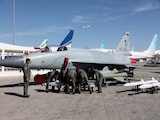- Australian pilot died in Brazil plane crash carrying 180kg of cocaine wrapped as SpaceX cargo
- Crash occurred near Coruripe, 500km north of Salvador, with packages marked SpaceX
- Plane had extra fuel tanks, suggesting a long-distance drug trafficking flight
An Australian pilot died when his plane, carrying 180kg of cocaine packaged in fake SpaceX wrapping, crashed into a sugarcane field in Brazil. The incident happened on September 14 near Coruripe, a coastal city about 500km north of Salvador, with photos depicting packages bearing SpaceX branding. Brazilian authorities, including the Federal Police and Mato Grosso Civil Police, are investigating the crash, which has raised questions about Timothy James Clark's involvement in an international drug trafficking operation, the Independent reported.
The federal police didn't disclose the plane's departure point or destination, but the presence of extra fuel tanks suggested it was on a long-distance journey, according to G1 Globo.
Mr Clark, a former Qantas pilot with over 20 years of aviation experience, was alone in the aircraft when it crashed shortly after takeoff from a rural airstrip. The plane, registered to a Brazilian owner, was reportedly carrying 180 kilograms of cocaine paste, a semi-processed form of the drug. The wreckage was found in a forested area, and investigators noted that the plane appeared to have experienced engine failure, though the exact cause remains under scrutiny.
No distress calls were reported, and the remote location of the crash site complicated initial response efforts. Authorities suspect the flight was part of a drug smuggling route, with the cocaine potentially destined for international markets, possibly Australia or Europe. Notably, the cocaine could be worth around $80 million on the street, particularly in Australia, if sold in smaller quantities.
Meanwhile, the pilot's background has added complexity to the case. Described as an experienced aviator who had flown for Virgin Australia and worked as a contractor for SpaceX, Mr Clark's LinkedIn profile highlighted his expertise in corporate jet operations across Australia, New Zealand, and Southeast Asia. His involvement in such a high-stakes criminal activity has stunned those who knew him, with no prior public record of illegal conduct. The investigation is focusing on how he became entangled in the operation.
Brazilian police are probing the plane's ownership and its potential links to regional drug cartels, known for exploiting remote airstrips in Mato Grosso for trafficking. Australian Federal Police are also involved, seeking to uncover any connections to organised crime networks in Australia.
The plane was registered to Zambia, although it had been operating in Brazil for at least two years.















